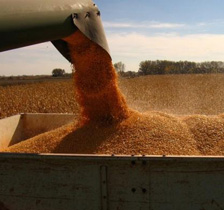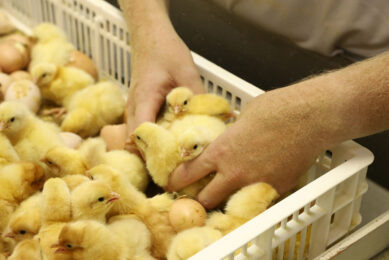Canadian poultry farmers told to stop use of bovine antibiotic

The Public Health Agency of Canada (CIPARS) is warning British Columbia poultry farmers and veterinarians to stop using a bovine antibiotic on chickens.
The agency believes the practice is behind a significant spike in a strain of Campylobacter in chicken that is resistant to an antibiotic commonly used to treat respiratory infections in human beings and cattle.
Routine testing of chicken from grocery stores detected a dramatic spike in drug-resistant Campylobacter bacteria in retail samples of B.C. chicken in 2009 and levels have remained stubbornly above normal in the province ever since.
Positive tests for the resistant strain of Campylobacter in retail chicken have ranged as high as 40% in B.C. and 28% in Saskatchewan compared with an average of less than 4% in the other provinces monitored by the Canadian Integrated Program for Antimicrobial Resistance Surveillance.
Campylobacter is the most common food-borne pathogen in Canada. It is usually associated with substandard food handling and consumption of undercooked chicken.
The rate of human Campylobacter poisoning in BC has been about 30% above the national average during the past 10 years, according to the BC Centre for Disease Control.
CIPARS is comparing Campylobacter from human cases in B.C. and Saskatchewan to the bacteria from retail poultry to determine whether the same pathogen is infecting people who eat poultry.
‘Off-label’ fluoroquinolone
A bulletin to be released this week by CIPARS attributes the increase in drug-resistant Campylobacter in B.C. chicken to use of the antimicrobial drug fluoroquinolone.
The agency says veterinary fluoroquinolones labelled for cattle are being used “off-label” to prevent salmonella in chicken in breeder flocks.
Health Canada requires fluoroquinolone-based veterinary drugs for cattle to carry a warning not to use them in any other species.
Public health authorities want to curb the use of fluoroquinolone in chickens because the risk of spreading drug resistance could render those medications ineffective.
It is not unusual for veterinarians to use antibiotics labelled for one species on another species, but steps are being taken within the poultry industry to stamp out the practice.
Association warning
B.C.’s poultry farming association has issued a warning written by Ministry of Agriculture veterinarian Bill Cox in a July bulletin instructing producers not to use prescription drugs on their flocks except under veterinary supervision and not to use any drug without a veterinary diagnosis.
Chicken Farmers of Canada executive director Mike Dungate said antimicrobial resistance is one of the industry’s “critical” concerns.
Chicken producers are required to report all medications given to their flocks to the Canadian Food Inspection Agency before they are sent for processing. That information is verified by government veterinarians, according to CFC safety program manager Steve Leech.
The CFC and CIPARS are developing a national on-farm surveillance program designed to record antimicrobial use and pinpoint the sources of antimicrobial-resistant pathogens.
“The CFC hopes the program will explain B.C.’s persistently higher incidence of antimicrobial-resistant Campylobacter and correlate that with on-farm practices,” Leech said.
The CFC maintains there is no conclusive use of veterinary drugs on farms with the drug-resistant bacteria detected in samples taken from chicken in B.C. grocery stores.
Join 31,000+ subscribers
Subscribe to our newsletter to stay updated about all the need-to-know content in the poultry sector, three times a week. Beheer
Beheer








 WP Admin
WP Admin  Bewerk bericht
Bewerk bericht